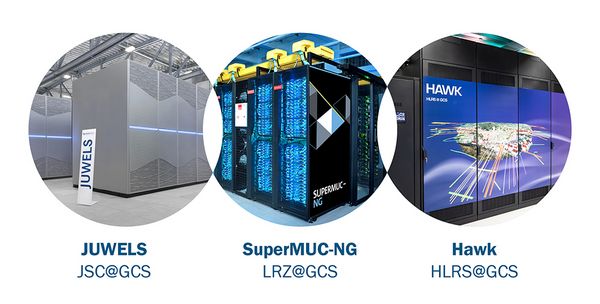NEWSFLASHES
GCS Awards 2.3 Billion Computing Core Hours for National Large-Scale Simulation Projects
Newsflash 07/2020 –
The supported projects come from the fields of astrophysics, bioinformatics and theoretical biology, condensed matter physics, nuclear and elementary particle physics, geology and scientific engineering. Scientists awarded with computing time allocations on the GCS HPC systems will have access to GCS’ petascale HPC resources immediately until the end of April 2021.
The largest individual allocations of the 23rd call were granted to two scientific engineering projects from the field of fluid dynamics: Both Dr.-Ing. Markus J. Kloker of the Institute of Aerodynamics und Gas Dynamics (IAG) at the University of Stuttgart and Dr.-Ing. Matthias Meinke of the Chair of Fluid Mechanics and Institute of Aerodynamics (AIA) at the RWTH Aachen University received 500 million core hours each on HPC system Hawk installed at the High-Performance Computing Center Stuttgart (HLRS) to support their projects, LAMTUR - Investigation of Laminar-Turbulent Transition and Flow Control in Boundary Layers - and Noise Reduction by Porous Material, Base-Flow Fields of Space Launchers and Transonic Buffet on Commercial Aircraft Wings respectively.
The two largest computing time allocations on HPC system JUWELS at the Jülich Supercomputing Centre (JSC) were given to two elementary particle physics research activities by Prof. Dr. Ulf-G. Meißner of the University of Bonn (project Nuclear Lattice Simulations) and Prof. Dr. Harvey B. Meyer of the Johannes Gutenberg-University Mainz (Baryon Structure from Lattice QCD with 2+1 Flavours of Wilson Quarks).
HPC system SuperMUC-NG at the Leibniz Supercomputing Centre in Garching near Munich (LRZ) supports ten of the 20 large-scale projects approved with the current call. The largest individual allocations on LRZ’s HPC system were given to an astrophysics project under leadership of Dr. Klaus Dolag representing the Faculty for Physics, Astronomy and Astrophysics at Ludwig-Maximilians-Universität München (The Local Universe: Cosmic Rays and Magnetic Fields and their Origin) and to Prof. Dr. Fakher Assaad of the Institute for Theoretical Physics at University of Würzburg for his project Topology, Entanglement, and Critical Phenomena in Correlated Quantum Matter.
The full list of research projects supported with computing time awarded through the 23rd large-scale call is available at https://www.gauss-centre.eu/results/large-scale-projects/article/gcs-large-scale-projects-call-23-february-2020/
--Regina Weigand
